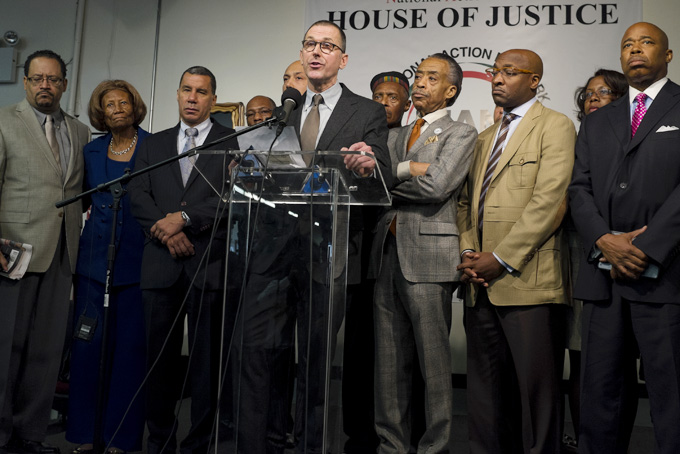
NEW YORK (AP) — In a review commissioned by Barneys New York, an attorney found the luxury store does not have a written or unwritten policy to profile customers based on race and didn’t initiate any police action against two Black customers who said they were wrongly accused of credit card fraud, complaints that ignited a furor.
Last month, the customers separately accused Barneys of racial profiling after they said they lawfully purchased expensive items but were detained by police on suspicion of credit card fraud. Customer Trayon Christian sued Barneys, saying he was accused of fraud after using his debit card to buy a $349 Ferragamo belt in April. Kayla Phillips filed a notice saying she would sue after she was stopped by detectives outside the store when she bought a $2,500 Celine handbag in February.
The complaints led to allegations that Barneys as well as other department stores were targeting minorities. The company head met with the Rev. Al Sharpton, and Jay Z was prompted to announce he would move forward with a planned Barneys collaboration despite public pressure that he back out of the deal amid the allegations.
The five-page report obtained Tuesday by The Associated Press is the first detailed look at accounts given by Barneys employees who were involved in the encounters. It was completed by San Francisco attorney Michael Yaki, who serves on the U.S. Commission on Civil Rights. Barneys retained him to lead a review of its policies and procedures after the complaints surfaced. Yaki reviewed written materials, policies and procedures and interviewed store employees. No police officers were interviewed.
According to the report, Barneys did not “request, require nor initiate the actions of the New York Police Department.” Employees did not determine that either customer should be questioned, and didn’t take any action on the belief that they had committed a crime.
The police department has disputed the claims and given differing accounts, saying that officers took action after conferring with Barneys employees.
“In both instances, NYPD officers were conducting unrelated investigations and took action after conferring with Barneys employees while in their security room,” John McCarthy, the police department’s chief spokesman, has said.
The report says police from the grand larceny unit and a precinct’s anti-crime unit would visit the store periodically, and that officers often stopped in the store’s control room, where its security camera feeds are located. Police Commissioner Raymond Kelly has said that officers don’t just hang out at department stores — they are there investigating crimes.
According to the report, in Christian’s case, officers were in the control room when the transaction occurred, believed it was too fast and could be fraudulent, and went to stop him before he left, though the Barneys employees said there was no reason to.
In Phillips’ case, officers asked to watch her on camera, though the sales associate who waited on her had no recollection of anything unusual about her transaction. Phillips was stopped outside the store after an officer overheard a statement she made, but was not arrested. The statement was the only reason cited by the officer who stopped her, according to a Barney’s employee who called police to find out what happened.
NYPD internal affairs officers are investigating both encounters and the department has given explanations that differ from Barneys’. According to police, in Christian’s case, officers were at the store on an unrelated arrest and were alerted to his presence by store employees. In Phillips’ case, officers were investigating someone else, saw her, then spoke to a cashier who said there was no name on the card she had used to buy the bag, and the cashier didn’t ask for identification, according to police. An officer overheard a statement and then stopped her based on the total circumstances, police said.The report deals only with the two incidents; a second report is also being completed that will be a broader look at the policies and any recommendations about those policies. No time frame for the release has been set.
